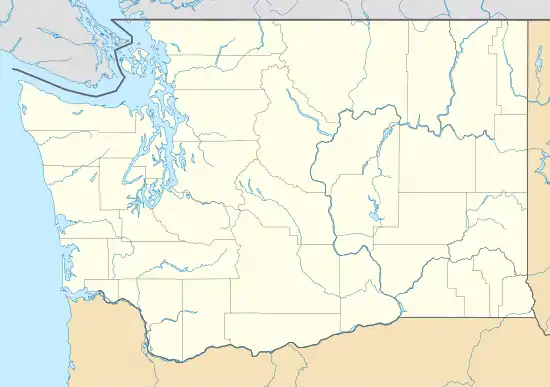Washington State Penitentiary
Washington State Penitentiary (also called the Walla Walla State Penitentiary) is a Washington State Department of Corrections men's prison located in Walla Walla, Washington. With an operating capacity of 2,200, it is the second largest prison in the state (after Coyote Ridge Corrections Center) and is surrounded by wheat fields. It opened 135 years ago in 1886, three years before statehood.
 Location in Washington | |
| Location | Walla Walla |
|---|---|
| Coordinates | 46°4′41″N 118°21′32″W |
| Status | Operational |
| Security class | Minimum, Medium, Close, Maximum |
| Capacity | 2,439 |
| Opened | 1886 |
| Managed by | Washington State Department of Corrections |
| Warden | Donald Holbrook, Superintendent |
| Street address | 1313 North 13th Ave. |
| City | Walla Walla |
| County | Walla Walla County |
| State/province | Washington |
| ZIP Code | 99362 |
| Country | United States |
| Website | www |
It was the site of Washington State's death row and where executions were carried out, until the Washington Supreme Court ruled the state's death penalty statute unconstitutional on October 11, 2018, thereby abolishing capital punishment in the state. Methods for execution were lethal injection and hanging.
Located at 1313 N. 13th Avenue, it is commonly known as "the Walls" among inmates and "The Penn" to the locals. The penitentiary is sometimes known as Concrete Mama, from a book with the same title by Ethan Hoffman and John McCoy. Elsewhere within Washington, and also to an extent in the surrounding states, the name Walla Walla is a metonym for the penitentiary. The penitentiary was the subject of the song "Walla Walla" by American punk rock band The Offspring.
History
Washington State Penitentiary opened in 1886, making it the oldest operational prison in Washington state.[1] Over a one-year period, starting in March 2002, more than one hundred inmates and staff at the Washington State Penitentiary were infected with Campylobacter jejuni. During this period, five clusters of the infection were identified, and genetic testing indicated that all of the bacteria were indistinguishable from each other. The source of this outbreak is not known, but contamination via pigeon feces, as well as unsafe food handling procedures, were examined.[2]
Notable prisoners
- Kenneth Bianchi, the Hillside Strangler.
- Terapon "Lee" Adhahn, convicted of rape of several children and rape/murder of a child in Tacoma, Washington.[3]
- Colton Harris-Moore. Famous thief, known as the "Barefoot Bandit", responsible for over 100 robberies and break-ins.
- Robert Lee Yates, American serial killer from Spokane. He had also worked at the prison before.[4]
- Lyle Beerbohm. American professional mixed martial artist who spent over a year in Walla Walla for drug-related crimes.
- Little Willie John. R&B singer who was sentenced to 8–20 years for manslaughter. Died at Walla Walla on May 26, 1968.[5][6][7]
- Billy Gohl. Union employee who murdered many sailors, Aberdeen.
- Linda Hazzard. Doctor known for murdering patients through her detox methods, Olalla, Washington.
- Kevin Coe. Convicted rapist from Spokane, often referred to in the news media as the "South Hill Rapist."
- Gary Ridgway. Convicted serial killer in south King County, referred to in the news media as the "Green River Killer."
- Gerald Friend. Convicted serial rapist and kidnapper, whose crimes after his release served as the inspiration for Nirvana song "Polly".
- Jack Owen Spillman. American serial killer from Spokane. Known as the "Werewolf Butcher."
- Henri Young. Convicted bank robber and cause célèbre.
Executed
- Jake Bird. Convicted double murderer and alleged serial killer. Hanged on July 15, 1949.
- Westley Allan Dodd. Serial killer. Hanged on January 5, 1993.
- Charles Rodman Campbell. Convicted of a triple homicide. Hanged on May 27, 1994.
Organization
The penitentiary has five groups:
- Camp/Minimum: 1-4 Years
- Protective Custody & Mental Health: 1 Year- Life
- Medium: 1 Year- Life
- Close: 1 Year- Life
- Maximum/Segregation: 1 Year- Life
In Popular Culture
- "Walla Walla" is the eighth song on The Offspring's 1998 album, Americana. The song is an ode to a friend who, after countless times getting off with a "slap on the wrist", has been sentenced to serve "three to five" years at Walla Walla.
See also
References
- http://www.doc.wa.gov/facilities/prison/wsp/
- Campylobacter Outbreak - Washington State Penitentiary
- http://www.courts.wa.gov/content/Briefs/A02/378931%20reply.pdf
- CrimeLibrary.com/Serial Killers/Sexual Predators/Robert Lee Yates Jr.: The Search for the Spokane Serial Killer
- "Little Willie John is arrested for murder after performing at Seattle's Magic Inn on October 17, 1964. - HistoryLink.org". www.historylink.org. Retrieved 2016-12-18.
- "Little Willie John". Rock & Roll Hall of Fame. Retrieved 2016-12-18.
- Johnson, Gary. "Michigan Rock and Roll Legends - LITTLE WILLIE JOHN". www.michiganrockandrolllegends.com. Retrieved 2016-12-18.
Further reading
- Murray, Christopher (2016). Unusual Punishment: Inside the Walla Walla Prison 1970-1985. Washington State University Press. ISBN 978-0-87422-339-2.
- McCoy, John (1986). Concrete Mama: Prison Profiles from Walla Walla (1st ed.). University of Missouri Press. ISBN 978-0-8262-0604-6.
- Longworth, Arthur (2016). Zek: An American Prison Story (1st ed.). Gabalfa Press. ISBN 978-0-9970-2990-1.